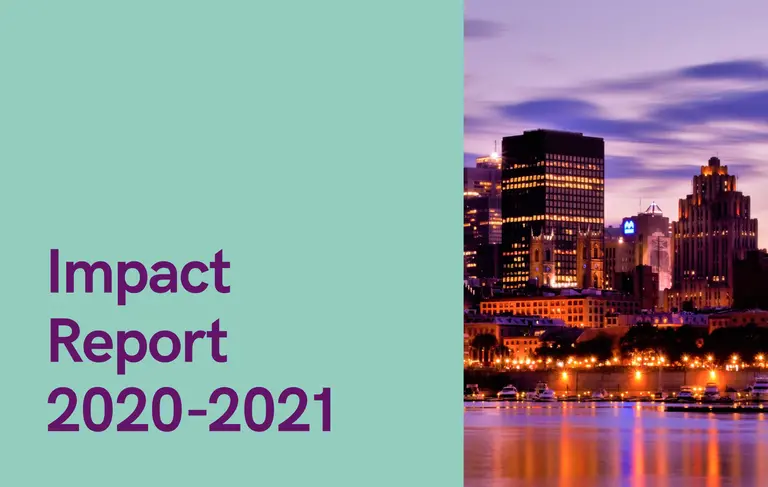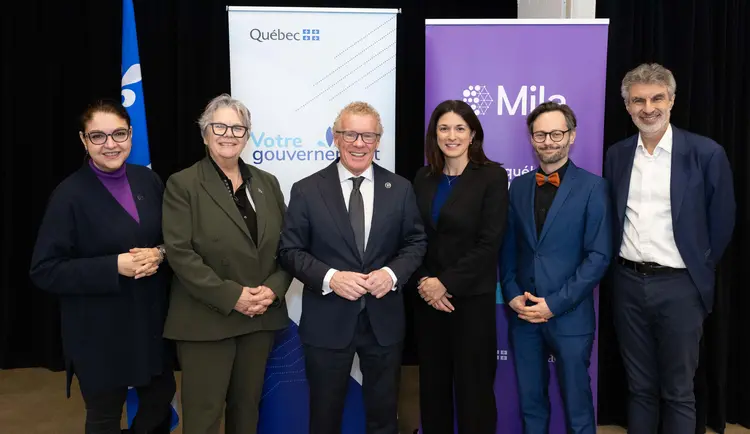
Founded in 2018, Mila is now one of the most renowned artificial intelligence research institutes in the world.
Montreal, November 18, 2021 – Mila, the Quebec AI Institute, unveils its first impact report reflecting its impressive growth and the many direct and indirect benefits recorded since 2018 in the context of the flourishing Quebec AI ecosystem.
Quote from Valérie Pisano, President and CEO, Mila
“Mila has experienced extraordinary growth since 2018. Very quickly, our institute has established itself by its strong scientific, social and economic impact. Montreal and Quebec have become a hub for artificial intelligence, a technology that has immense potential to address the challenges facing our businesses and communities. We can be proud of what we have accomplished and must build on our strategic pillars for the next phase of our growth, such as cutting-edge research, attracting the best talent, developing social influence and contributing to AI adoption.”
Quote from Pierre Boivin, President of the Board of Directors, Mila
“Mila is undoubtedly central to Quebec’s artificial intelligence ecosystem. We can be proud of this institute, now recognized as one of the most successful and attractive in the world. Mila allows Quebec to attract the best AI talent and thereby gain an important competitive advantage to help Quebec companies accelerate their AI adoption and attract technology companies seeking the best AI talent.”
Quote from Yoshua Bengio, Founder and Scientific Director, Mila
“I am very proud of the incredible momentum that Montreal and Quebec have experienced in developing their artificial intelligence sectors. From a handful of professors and students just a few years ago, Mila has grown to a community of nearly 1,000 professors, researchers, staff, and partners making it one of the global pillars of machine learning research. I am very confident that the work done by our teams will continue to have a major impact on science. Recent advances also allow us to see AI as a vector for solutions to global and collective issues such as health and the environment. The future of AI research is promising, and Montreal is the hub making a difference in the development and deployment of AI solutions.”
Mila’s scientific and academic impact has increased substantially since 2018.
- While there were about 200 student researchers at the beginning, the institute now counts more than 800, of which more than 70% come from outside Quebec, confirming the attractiveness of Mila and Quebec in this area;
- At the heart of the institute’s research activities is the faculty, which has tripled and now includes more than 87 associate and core professors globally recognized as leading experts in AI and related fields such as health and the environment;
- Among its faculty, Mila counts 48 Canada CIFAR AI Chairs, representing 44% of the total number of Chairs in Canada;
- Mila researchers published over 1,400 peer-reviewed articles, more than 340 of which were published in collaboration with at least one industry partner;
- Thanks in part to Mila, Montreal is now ranked the number one city in Canada for university research funding in AI, with $1.34B yearly.
Mila has established itself as a key driver for local and foreign investments and as an important economic player.
- The number of local and international industry partners has grown to 84, which represents an increase of over 400% in four years and 100% in the last year;
- Since 2018, over 30 international technology companies have set up an AI research lab or a place of business in Montreal;
- Since its inception, Mila's applied research team has worked on more than 112 projects to help companies at home and abroad accelerate the development and deployment of artificial intelligence in their products and services;
- More than 176 Mila interns have worked in Quebec companies since 2018 to help them make the shift towards AI;
- 46 startups are members of Mila. Of those, 16 were started at Mila and more than half of these startups are Quebec-owned;
- Mila actively contributes to the success of the Next AI, Creative Destruction Lab and Centech programs which have been integral to the advancement of dozens of AI startups in recent years.
The rise of Mila and the Quebec AI ecosystem has had a significant economic impact, according to work done by Mila and McKinsey.
- Artificial intelligence was an important vector of job creation in 2020 with more than 19,400 people working in jobs directly related to the sector. In Montreal alone, more than 95,000 jobs are indirectly linked to AI.
- In 2020, AI in Quebec led to the creation of approximately 3,500 new direct jobs, generating $625 million in economic value creation, for an additional direct contribution of $385 million to GDP.
- According to a conservative estimate, we find that the first public investments in artificial intelligence had a 1.76x leverage effect in terms of economic value creation.
- In addition, Montreal and Quebec AI startups received more than $1.7B in venture capital funding between 2018 and 2020.
Mila is committed at the highest level to continue making Quebec a global benchmark in AI. In the spirit of this commitment, we presented recommendations as part of the public consultation on Quebec’s new research and innovation strategy. We are also proud to participate in the Great Gathering on Quebec Innovation (“Grand Rendez-vous de l’innovation québécoise”) that will take place on November 18-19, 2021.
To read the full Mila Impact Report, visit www.mila.quebec/en/impact.
For the report summary, click here.
About Mila
Founded by Professor Yoshua Bengio of the University of Montreal, Mila is an artificial intelligence research institute that brings together nearly 900 researchers specializing in machine learning. Based in Montreal, Mila’s mission is to be a global hub for scientific advances that inspire innovation and development of AI for the benefit of all. Mila is a non-profit organization recognized worldwide for its significant contributions to the field of deep learning, particularly in language modeling, machine translation, object recognition, and generative models. For more information, visit mila.quebec.
Media Requests:
Eric Aach
514-569-3594
For more information:
Ludovic Soucisse
Head of Communications and Public Relations, Mila
514-378-8425





